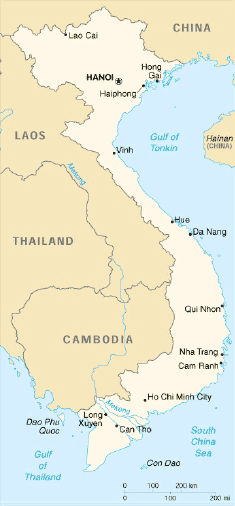

| GOVERNMENT | |
| Government type: | Communist |
| Head of state: | President Tran Duc LUONG (24 Sept 1997) |
| Capital: | Hanoi:
2,961,000 Ho Chi Minh (Saigon): 4,000,000 |
| Independence: | 2 September 1945 (from France) |
|
PEOPLE |
|
| Population: | 79,939,014 (July 2001 est.). 12th largest nation in the world. |
| Density: | 580 per sq mile |
| Literacy rate: | 93.7% |
| Life expectancy: | 69 |
| Languages: | Vietnamese (official), French, English, Khmer, Chinese |
| Ethnic Groups: | Vietnamese 85%-90%, Chinese 3%, Muong, Thai, Meo, Khmer, Man, Cham & other hill tribes |
| GEOGRAPHY | |
| Time: | GMT +7 |
| Land area: | 325,360 sq km, 126,890 sq miles |
| Comparative area: | slightly larger than Italy, slightly smaller than Japan |
| Climate: | South
- tropical - average temperature 27C, 80°F. Rainy season May -
September. Dry season December - April. North - monsoonal - average temperature 21°C, 70°F. Hot rainy season mid-May - mid-September. Warm & dry mid-October - mid-March. |
| RELIGION | |
| Religions: |
Buddhist 52%
39.5 million (Mahayna Buddhism predominant) Christian total
9.8% 7.5 million - growth 6.2% |
|
Four great philosophies
and religions have shaped the spiritual life of the Vietnamese people:
Confucianism, Taoism, Buddhism and Christianity. Over the centuries,
Confucianism, Taoism and Buddhism have melded with popular Chinese
beliefs and ancient Vietnamese animism to form what is known as
Tam Giao or `Triple Religion'. There is an estimated 150,000 to 300,000 Hmong believers in northern Vietnam (due mainly to the FEBC radio broadcasts). Approximately 30 Hmong church leaders had been jailed or detained in the past year. Official documents seen by Reuters show that Communist Party units and local authorities in Ha Giang and one other province had launched campaigns from 1997 to stop people adopting Christianity, which is seen as an imperialist tool. There is a desperate need for Hmong bibles but these are illegal and in very short supply, the majority of believers have never seen one. |
|
| HISTORY | |
|
France first unified Vietnam in 1887, when a single governor-generalship was created. Communist leader Ho Chi Minh organised an independence movement known as the Vietminh. Ho Chi Minh's declaration of Vietnamese independence after WWII sparked violent confrontations with the French, culminating in the French military defeat in 1954. The Geneva Accords of 1954 temporarily divided Vietnam into the Communist north and the anti-Communist, US-supported south. Political and ideological opposition quickly turned to armed struggle, prompting the USA and other countries to commit combat troops in 1965. The Paris Peace Agreements in 1973, provided an immediate cease-fire and signalled the withdrawal of US troops. Saigon surrendered to the Communist forces on 30 April 1975. |
|
| The cost: | 10%
of the population of Vietnam were killed or injured; every road and
rail bridge in the country was bombed along with 4000 of N Vietnam's
5788 villages. 223,748 South Vietnamese soldiers killed 1 million Vietcong (est) killed 4 million civilians killed 58,183 Americans killed |
| ECONOMY | |
| Industries: | food processing, garments, shoes, machine building, mining, cement, chemical fertiliser, glass, tires, oil |
| Agriculture products: | rice, corn, potatoes, rubber, soybeans, coffee, tea, bananas,poultry, pigs, fish |
| Exports: | $14.3 billion (f.o.b., 2000) |
| Imports: | $15.2 billion (f.o.b., 2000) |
| GDP/PPP | $1.54 billion; $1,950 per capita (2000) |
| Inflation: | 0.06% (2000). |
| Unemployment: | 25% (1996) |
| Population below poverty line: | 37% (1998 est.) |
| Income per person | $300 per annum |
| Currency | dong |
| Exchange rates: | $1US = 15,000dong |
| TOP OF PAGE | HOME PAGE | |